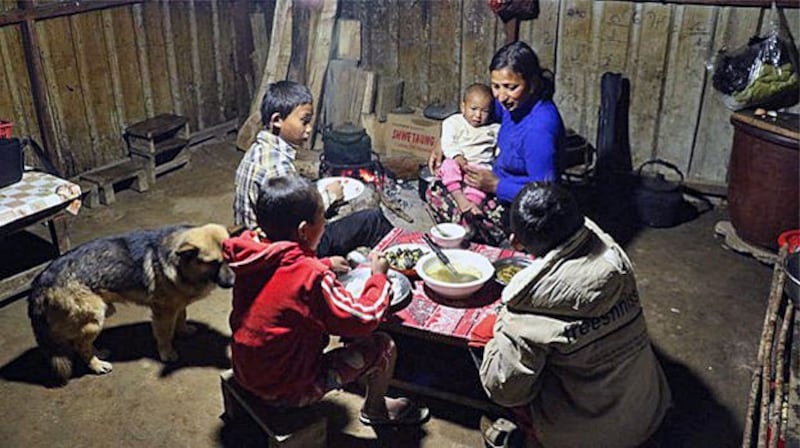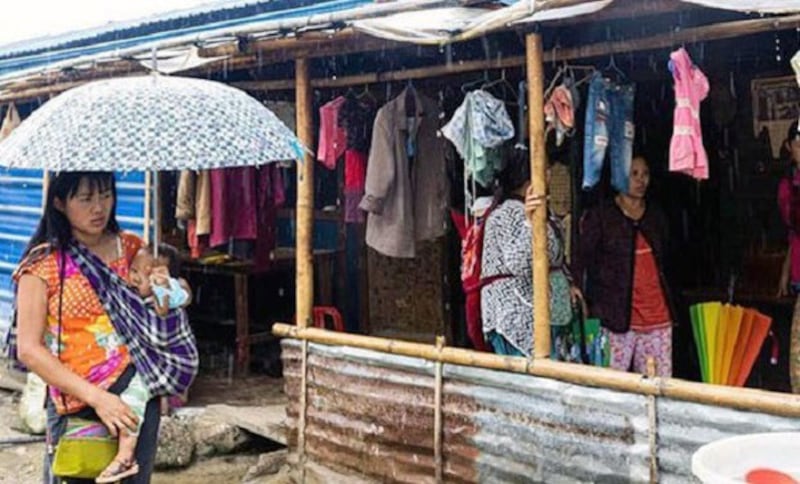Facing food shortages in overcrowded camps where they’ve been living for a decade, more than 1,000 people in Myanmar’s northern Kachin state have returned to their villages – despite fears that fighting could flare up at any time, they told Radio Free Asia.
Their lives in the camps, where they had fled in 2011, have gotten increasingly unbearable with rising prices for necessities and a lack of nutritious food, medicine and health services.
Junta forces have blocked roads and confiscated food and medicine from transport vehicles and money is difficult to access due to the collapsed banking system.
“Our lives are too difficult,” said a resident of Ga Yar Yan village, who like others in the story declined to be named for safety reasons. “We can no longer live here [in the camps].”
But returnees face huge uncertainties because other people have settled in the homes and farms they abandoned years ago and have been using their belongings.
So far, about 200 of the 500 families from the village who had been sheltering in camps have returned home, while the remainder fear that fighting will resume amid fighting between the junta and various rebel groups.
Displaced since 2011
Back in 2011, about 150,000 people were uprooted from their homes when fighting resumed between Myanmar forces and the Kachin Independence Army, or KIA, an ethnic group seeking autonomy.
Since then, they’ve been living in more than 160 makeshift camps around Myitkyina, the state capital, with another 10,000 people joining them because of hostilities since the 2021 coup.
In all, about 1.2 million people in Myanmar remain displaced by conflict and insecurity since the military takeover in February 2021, bringing the total number of internally displaced people across the country to more than 1.5 million, according to the United Nations Office for the Coordination of Humanitarian Affairs.
The roughly 330,000 people displaced by fighting prior to February 2021 are primarily in Kachin, Rakhine, Chin and Shan states, the U.N. agency said.

While some of the IDPs have decided not to resettle but rather work temporarily on their farms to grow food, others who want to move permanently say they need assistance to build homes, clinics and schools in their old villages in Kachin state, which borders China's Yunnan province.
The Kachin Baptist Convention, an evangelical Christian group, is providing assistance to the returnees, an official from the organization said.
“Some social communities have formed Self Alliance Plans and volunteered to help them return home,” the official said, referring to self-help groups the IDPs have formed by making alliances with others to leave the camps in a systematic manner.
“There are more internally displaced people planning to return to their homes, and [they] have arranged their own returns through these plans,” the KBC official said.
Some people encamped around Myitkyina township are considering returning home at the end of February, though they may not be able to do so because of the presence of military and KIA bases and their activities in their areas, he said.
Junta had promised help
When junta officials visited Myitkyina’s Jang Mai Kawng camp in December 2022, they pledged to help the residents return home the following summer, which begins this March in Myanmar, when schools will be closed, a camp official said.
But the military government has not followed through, he said.
A deputy minister from the regime told the internally displaced people at the time that the government could not build new houses for them, but would provide a certain amount of cash to each household, he said.
The deputy minister told them that they would have to invest more money of their own if they wanted better houses than what the cash from the government could provide.
“Although he said this, we have not received any specific information regarding it,” the camp official said.
Uncertain future
Khun Sai, a displaced person who lives at the Sha-it Yang camp in Waingmaw, said he wants to go home but cannot do so because junta forces and KIA operatives often visit his village, Sampai.
“It is a worrisome place as armed forces are always active there,” he said. “That’s why we have formed a return committee and are making some possible arrangements. We don’t know when we will be able to go home, but we are trying to make it possible in 2024.”
Win Ye Tun, the junta spokesman for Kachin state, said state officials were providing assistance to the uprooted people.
“For example, we helped rebuild a village in Nam Sang Yang and repaired some schools there,” he told RFA. “The main thing is that we are planning and helping the ethnic groups to be able to return to their homes with dignity.”

KIA spokesman Col. Nawbu said he instructed the people in the camps to go back to their homes to work on their farmland if they cannot yet resettle there permanently.
A religious teacher from Ga Yar Yan village said some villagers there who risked their lives to return home are prepared to flee back to the camps if fighting resumes.
“They returned not because it is safe and secure, but because it’s been 12 years,” the teacher said. “It’s impossible to go on like this. … But if there is fighting, we will flee back to the refugee camps.”
Translated by Myo Min Aung for RFA Burmese. Edited by Roseanne Gerin and Malcolm Foster.
